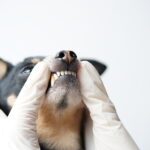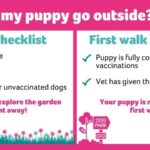Why Do Dogs Sniff Your Private Areas
Curious Canines: Why Dogs Sniff Your Private Areas
Dogs are known for their keen sense of smell. Their noses can detect a wide range of odors, from the faintest traces of pheromones to the strongest stenches of rotting garbage. While most dogs use their noses to explore the world around them, some dogs seem to have a special interest in sniffing human crotches or buttocks. This behavior can be embarrassing, uncomfortable, or even alarming for some people, but it is perfectly normal and natural for dogs. In this article, we will explore the reasons why dogs sniff your private areas and what you can do about it.
The Anatomy of Smell
To understand why dogs sniff your private areas, we need to first appreciate how they perceive smells. Unlike humans, who have about 6 million olfactory receptors in their noses, dogs have up to 300 million olfactory receptors. Moreover, the part of their brains that processes smells is proportionally much larger than ours. This means that dogs can distinguish and identify scents that are too subtle or complex for us to notice.
Dogs also use their noses differently than we do. While we breathe through our nostrils and mouth, dogs have an additional organ called the vomeronasal organ (VNO) or Jacobson’s organ, located at the base of their nasal cavity. The VNO is specialized in detecting pheromones, which are chemical signals that animals use to communicate with each other. Pheromones can convey information about sex, health, dominance, territory, and social bonding.
When a dog sniffs another dog’s butt or genitals, it is not trying to be rude or vulgar. Rather, it is trying to gather information about the other dog’s identity and status. Dogs have unique scent signatures that reveal their breed, age, sex, reproductive status, diet, and health. By sniffing another dog’s private areas, a dog can also detect whether the other dog is in heat, pregnant, or sick. This information can help a dog decide whether to approach or avoid the other dog, and how to interact with it.
Dogs also use their sense of smell to explore their environment. They can detect the presence of food, water, prey, predators, or objects from afar. They can follow scent trails left by other animals or humans. They can even smell emotions such as fear, anxiety, or happiness in humans. When a dog sniffs your crotch or butt, it may be trying to gather information about your mood, health, or identity.
The Social Significance of Smell
In addition to conveying information about oneself and others, smells also play a crucial role in social behavior among dogs and humans. Dogs rely on olfactory cues to establish and maintain social bonds with their pack mates and owners. They sniff each other’s faces, ears, paws, and butts as a way of greeting, showing affection, or reinforcing hierarchy. They also mark their territory with urine and feces as a way of communicating their presence and dominance.
When a dog sniffs your private areas, it may be treating you as if you were another dog. It may be trying to greet you or show submission. It may also be trying to assert its dominance over you or challenge your authority. However, dogs do not necessarily perceive humans as dogs all the time. Some dogs learn to differentiate between human smells and canine smells based on context and experience.
For example, some dogs may only sniff certain parts of a person’s body when they are wearing certain clothes or fragrances that trigger their curiosity or aversion. Some dogs may only sniff people who are familiar to them or who have interacted with them positively before. Some dogs may only sniff people who seem anxious or stressed because they emit different pheromones than relaxed or happy people.
What You Can Do About It
If your dog is sniffing your private areas too often, too intensely, or too intrusively, you may feel uncomfortable or annoyed. However, punishing your dog for this behavior may backfire and cause more stress or anxiety. Instead, you can try the following strategies to manage your dog’s sniffing habit:
1. Train Your Dog to Stop Sniffing on Command: You can teach your dog a verbal cue such as “leave it” or “off” that tells it to stop sniffing and return to you. You can reward your dog with treats or praise when it obeys the cue.
2. Distract Your Dog with a Toy or Treat: You can offer your dog a toy or treat that is more appealing than your crotch or butt. You can toss the toy or treat away from you and encourage your dog to fetch it.
3. Redirect Your Dog’s Attention: You can redirect your dog’s attention to another activity such as playing fetch, going for a walk, or practicing obedience commands. You can also provide your dog with interactive toys that stimulate its sense of smell and brain.
4. Use Positive Reinforcement: You can reward your dog for good behavior such as sitting calmly beside you without sniffing. You can use treats, toys, or affectionate gestures such as petting or massaging.
5. Seek Professional Help: If your dog’s sniffing behavior is causing significant problems for you or others, you may want to consult a veterinarian, a certified dog trainer, or a behaviorist who specializes in canine communication and training.
Conclusion
Dogs sniff your private areas for various reasons related to their anatomy, physiology, and social behavior. While this behavior may be normal and natural for dogs, it may be uncomfortable or embarrassing for some people. By understanding why dogs sniff and how to manage their sniffing habit, you can prevent conflicts and strengthen your bond with your furry friend. Just remember that dogs do not mean to offend or harm you by sniffing your crotch or butt. They just want to explore the world in their own way.



